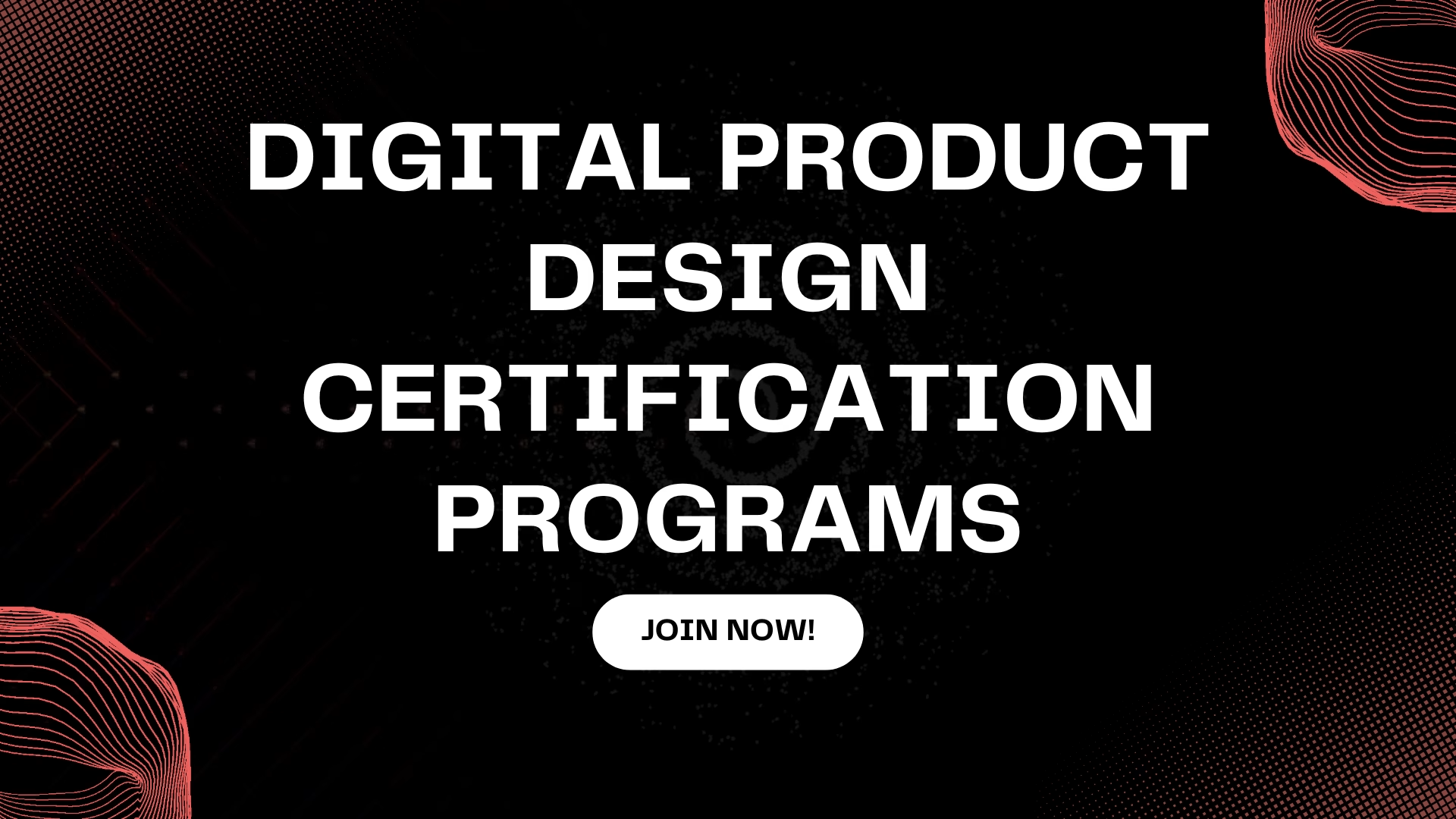Digital Product Design Certification Programs

Digital product design focuses on crafting functional, aesthetic, and user-friendly solutions for the ever-evolving digital landscape. Whether it’s apps, websites, or software, digital designs must prioritize user experience (UX) and user interface (UI) to ensure seamless functionality and satisfaction. As businesses worldwide shift toward digital platforms, the demand for skilled digital product designers has skyrocketed, making certification programs in this field an invaluable asset for professionals and aspiring designers alike.
These programs offer an immersive learning experience, equipping learners with the ability to conceptualize, prototype, and execute innovative digital products. Platforms like EdCroma provide cutting-edge training that integrates theoretical foundations, modern tools, and practical applications, enabling students to transform ideas into impactful digital solutions.
Why Pursue a Certification in Digital Product Design?
- High Demand for Digital Products
In a world driven by technology, businesses depend on intuitive, user-friendly designs to stay competitive. From startups to global enterprises, the need for skilled designers to bridge the gap between technology and user needs has never been more critical. Certifications in digital product design enhance credibility and help professionals meet this growing demand effectively. - Versatility Across Industries
Digital product design isn’t confined to a single industry. Its applications span e-commerce, healthcare, education, finance, entertainment, and beyond. Certified designers can explore diverse career paths, working on projects that range from crafting e-learning platforms to revolutionizing fintech apps. This versatility ensures a dynamic and fulfilling career. - Stay Updated with Trends
The digital design landscape evolves rapidly, with new tools, trends, and methodologies emerging regularly. Enrolling in a certification program ensures that professionals stay ahead of the curve by mastering the latest design practices and technologies. Staying updated not only enhances one’s competitiveness but also broadens creative possibilities. - Portfolio Building
A strong portfolio is essential for showcasing skills and landing lucrative projects. Certification programs, like those offered by EdCroma, provide hands-on opportunities to work on real-world projects. This practical approach allows learners to develop a diverse portfolio that highlights their creativity, technical proficiency, and problem-solving abilities. - Career Advancement
Whether you are a beginner or a seasoned designer seeking to upskill, a certification validates your expertise and gives you an edge in the competitive job market. Employers value certifications as a testament to one’s commitment to professional growth, opening doors to advanced roles and higher earning potential.
Here is the Link to Join the Course: Digital Product Design Course
Key Skills Covered in Digital Product Design Certifications
Certification programs emphasize a comprehensive skillset, blending technical knowledge with creative problem-solving. Here are the essential skills learners can expect to develop:
- User Research: Understanding user behavior, needs, and pain points through research techniques like interviews, surveys, and analytics.
- Wireframing and Prototyping: Learning to create both low-fidelity and high-fidelity mockups to visualize concepts effectively.
- UI/UX Principles: Mastering the principles of designing interfaces that are not only visually appealing but also intuitive and functional.
- Design Tools Mastery: Developing proficiency in industry-standard tools like Figma, Adobe XD, and Sketch for crafting polished designs.
- Accessibility and Inclusivity: Ensuring that digital products cater to diverse user groups, including those with disabilities, to promote inclusivity.
- Interaction Design: Enhancing user engagement through the use of animations, transitions, and other interactive elements.
- Testing and Iteration: Conducting usability tests to gather feedback and refine designs for optimal performance and user satisfaction.
Get a comprehensive overview of Digital Product Design from Wikipedia.
Top Digital Product Design Certification Programs
- Digital Product Design Certification – EdCroma
- Overview: A well-rounded course that delves into UX research, UI design, and prototyping, preparing learners for real-world challenges.
- Highlights: Real-world projects, industry-aligned curriculum, and mentorship from seasoned design experts.
- Duration: Flexible, with options for self-paced learning supplemented by live sessions.
- Cost: Affordable, with financial aid options available.
- Ideal For: Both beginners and experienced professionals looking for industry-recognized certification.
- Google UX Design Certificate – Coursera
- Overview: A comprehensive program focusing on the fundamentals of user experience design and practical application.
- Highlights: Includes hands-on projects and case studies, providing learners with actionable insights.
- Duration: Approximately 6 months, requiring 10 hours per week.
- Cost: Subscription-based, offering accessible pricing for learners worldwide.
- Ideal For: Individuals new to the field of UX/UI design.
- Interaction Design Specialization – University of California, San Diego (Coursera)
- Overview: An advanced program exploring the intricacies of interaction design and human-computer interaction.
- Highlights: Features capstone projects and modules on cutting-edge design concepts.
- Duration: Spanning 8 months, with a recommended commitment of 5 hours per week.
- Cost: Subscription-based, offering value for professionals seeking specialization.
- Ideal For: Experienced designers aiming to deepen their expertise.
- UI/UX Design Bootcamp – Springboard
- Overview: An immersive course focusing on building job-ready skills in digital product design.
- Highlights: Includes personalized mentorship, robust portfolio development, and career services.
- Duration: 9 months, with an intensive schedule of 20-25 hours per week.
- Cost: Premium pricing, with a job guarantee for graduates.
- Ideal For: Career switchers and professionals seeking one-on-one mentorship.
- Human-Computer Interaction (HCI) – edX (Georgia Tech)
- Overview: A research-oriented program focusing on the interaction between users and digital interfaces.
- Highlights: Combines theoretical depth with practical applications to foster a deeper understanding.
- Duration: 12 weeks, self-paced.
- Cost: Free to audit, with a paid certification option.
- Ideal For: Professionals interested in the principles of HCI.
Benefits of Choosing EdCroma for Digital Product Design Certification
EdCroma stands out as a top-tier platform for digital product design certification, offering a transformative learning experience. Here’s what makes EdCroma unique:
- Industry-Driven Curriculum: Content designed with insights from industry leaders ensures the program stays relevant and impactful.
- Hands-On Learning: Real-world projects and live case studies simulate actual industry challenges, allowing learners to apply their skills practically.
- Expert Guidance: With mentors who bring years of design experience, students receive valuable feedback and career advice.
- Recognized Certification: EdCroma’s credentials are widely respected by employers, significantly boosting your career prospects.
- Flexibility: The program’s self-paced structure accommodates busy schedules, making it accessible for learners worldwide.
Career Opportunities After Certification
A certification in digital product design unlocks a range of rewarding career opportunities. Potential roles include:
- UI/UX Designer: Focus on creating intuitive interfaces and optimizing user experiences.
- Product Designer: Lead the design process from initial concept to final execution.
- Interaction Designer: Use animations and interactions to enhance user engagement.
- Visual Designer: Specialize in the aesthetics and branding of digital products.
- Design Researcher: Conduct in-depth user research to inform and refine designs.
- Freelance Designer: Work on diverse projects independently, building a versatile portfolio.
How to Choose the Best Certification Program
Selecting the right certification program is critical to achieving your career goals. Consider the following factors:
- Curriculum: Ensure the program covers essential topics such as UX research, wireframing, and prototyping.
- Certification Credibility: Opt for programs with recognized credentials, such as those offered by EdCroma.
- Hands-On Experience: Look for courses with practical projects and opportunities to build a strong portfolio.
- Mentorship and Support: Programs offering expert guidance can provide valuable insights and support throughout your learning journey.
- Cost and Accessibility: Choose a program that fits your budget and schedule, balancing quality with affordability.
Conclusion
Digital product design plays a pivotal role in shaping user-centric solutions that drive business success. Certification programs, like those offered by EdCroma, provide the tools, knowledge, and hands-on experience needed to excel in this dynamic field. Whether you are starting your journey or advancing your career, these programs equip you to build a robust skillset, expand your professional horizons, and contribute to groundbreaking digital innovations.
Take your first step with EdCroma’s certification program and turn your passion for design into a fulfilling career that impacts the digital world!




